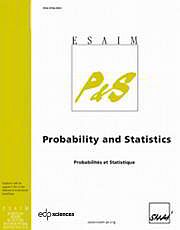Crossref Citations
This article has been cited by the following publications. This list is generated based on data provided by Crossref.
Leucht, Anne
and
Neumann, Michael H.
2013.
Dependent wild bootstrap for degenerateU- andV-statistics.
Journal of Multivariate Analysis,
Vol. 117,
Issue. ,
p.
257.
Dedecker, Jérôme
Rio, Emmanuel
and
Merlevède, Florence
2014.
Strong approximation of the empirical distribution function for absolutely regular sequences in ${\mathbb R}^d$.
Electronic Journal of Probability,
Vol. 19,
Issue. none,
Alj, Abdelkamel
Azrak, Rajae
and
Mélard, Guy
2014.
On conditions in central limit theorems for martingale difference arrays.
Economics Letters,
Vol. 123,
Issue. 3,
p.
305.
Banna, Marwa
and
Merlevède, Florence
2015.
Limiting Spectral Distribution of Large Sample Covariance Matrices Associated with a Class of Stationary Processes.
Journal of Theoretical Probability,
Vol. 28,
Issue. 2,
p.
745.
Dyckerhoff, Rainer
Ley, Christophe
and
Paindaveine, Davy
2015.
Depth-based runs tests for bivariate central symmetry.
Annals of the Institute of Statistical Mathematics,
Vol. 67,
Issue. 5,
p.
917.
Krampe, J.
Kreiss, J.-P.
and
Paparoditis, E.
2015.
Hybrid wild bootstrap for nonparametric trend estimation in locally stationary time series.
Statistics & Probability Letters,
Vol. 101,
Issue. ,
p.
54.
Mishchenko, Yuriy
2016.
Consistent estimation of complete neuronal connectivity in large neuronal populations using sparse “shotgun” neuronal activity sampling.
Journal of Computational Neuroscience,
Vol. 41,
Issue. 2,
p.
157.
Bachoc, François
Lagnoux, Agnès
and
Nguyen, Thi Mong Ngoc
2017.
Cross-validation estimation of covariance parameters under fixed-domain asymptotics.
Journal of Multivariate Analysis,
Vol. 160,
Issue. ,
p.
42.
Geller, Juliane
and
Neumann, Michael H.
2018.
Improved local polynomial estimation in time series regression.
Journal of Nonparametric Statistics,
Vol. 30,
Issue. 1,
p.
1.
Kokoszka, Piotr
Miao, Hong
Reimherr, Matthew
and
Taoufik, Bahaeddine
2018.
Dynamic Functional Regression with Application to the Cross-section of Returns.
Journal of Financial Econometrics,
Vol. 16,
Issue. 3,
p.
461.
Mansour, Toufik
Rastegar, Reza
and
Roitershtein, Alexander
2019.
On Ballistic Deposition Process on a Strip.
Journal of Statistical Physics,
Vol. 177,
Issue. 4,
p.
626.
Bachoc, François
Bevilacqua, Moreno
and
Velandia, Daira
2019.
Composite likelihood estimation for a Gaussian process under fixed domain asymptotics.
Journal of Multivariate Analysis,
Vol. 174,
Issue. ,
p.
104534.
Poignard, Benjamin
2020.
Asymptotic theory of the adaptive Sparse Group Lasso.
Annals of the Institute of Statistical Mathematics,
Vol. 72,
Issue. 1,
p.
297.
Babii, Andrii
Ghysels, Eric
and
Striaukas, Jonas
2020.
Inference for High-Dimensional Regressions With Heteroskedasticity and Auto-correlation.
SSRN Electronic Journal ,
Bachoc, François
Betancourt, José
Furrer, Reinhard
and
Klein, Thierry
2020.
Asymptotic properties of the maximum likelihood and cross validation estimators for transformed Gaussian processes.
Electronic Journal of Statistics,
Vol. 14,
Issue. 1,
Hafouta, Yeor
2023.
Convergence rates in the functional CLT for α-mixing triangular arrays.
Stochastic Processes and their Applications,
Vol. 161,
Issue. ,
p.
242.
Merlevède, Florence
and
Peligrad, Magda
2023.
High Dimensional Probability IX.
Vol. 80,
Issue. ,
p.
229.
Kluger, Dan M.
and
Owen, Art B.
2024.
A central limit theorem for the Benjamini-Hochberg false discovery proportion under a factor model.
Bernoulli,
Vol. 30,
Issue. 1,
Borgonovo, Emanuele
Plischke, Elmar
and
Prieur, Clémentine
2024.
Total effects with constrained features.
Statistics and Computing,
Vol. 34,
Issue. 2,
Bachoc, François
Muehlmann, Christoph
Nordhausen, Klaus
and
Virta, Joni
2024.
Large-sample properties of non-stationary source separation for Gaussian signals.
Electronic Journal of Statistics,
Vol. 18,
Issue. 1,

